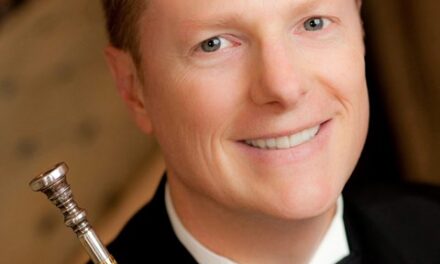The Lenoir-Rhyne University A Cappella Choir made a joyful noise in the First Baptist Church when it presented its spring concert, “Songs of Praise and Remembrance”, with Guest Conductor John Gordon Ross, who is also Music Director of the Western Piedmont Symphony.
Opening the program was “Psalm 100” by Christian Ignatius Latrobe (1758-1836), an English clergyman, musician, and composer who wrote a large number of works for the Moravian Church. Opening and closing choral sections frame a tenor aria, ably sung by Jairo A. Pereira. The chorus was bright and clear, setting the mood of thanksgiving of the psalm.
“How Lovely is Thy Dwelling Place” from A German Requiem, Op. 45 by Johannes Brahms (1833-1897) followed. This section, the fourth and the midpoint of the work, follows three very dark movements, and opens a new bright and tranquil world. The choir sang with great tenderness and warmth.
Charles Ives’ (1874-1954) “Psalm 90” for chorus, organ, and bells, in typical Ives fashion, is filled with dissonant chromatic tone clusters, and at one point reaches 22 separate voice parts. After all this anger and wrath, the music subsides into a very pleasant C major theme. The choir, ably assisted by Florence Jowers on organ, and Rae Miller, Eric Hopkins, and Josh Keener on bells, sang this very difficult work with great strength and vigor, evoking the fury of the creator.
Alice Parker’s (born 1925) Kentucky Psalms completed the first half of the program. Parker, a distinguished composer, conductor, and teacher who studied and collaborated with Robert Shaw, wrote her “Kentucky Psalms” in 1984 for the bicentennial of The Presbyterian Church of Danville, Kentucky. A cantata for chorus, flute, and strings, the work comprises four hymns from early 19th-century Kentucky song books. The first, “Zion”, radiates joy, the second, “Vergennes,” a plaintive longing for home. “Amanda,” the third hymn, is a reflection on death, and the final, “Washington,” is joyful and celebratory. Flutist Laura Stevens gave the entire work a bright lovely resonance to augment the energetic and robust performance by the choir.
The featured work of the program, Requiem, Op. 48 by Gabriel Fauré (1845-1924), concluded the concert. Beethoven believed that a requiem ought to be quiet music, an idea with which Fauré obviously agreed, as this is a very gentle work, not unlike the composer himself. Fauré wrote that it was supposed to be a “lullaby of death…a happy deliverance rather than a mournful passing.” And that is exactly what the choir offered – great joy and peace. Chelsie Propst, soprano soloist for “Pie Jesu,” sang with bell-like clarity and tranquility, and baritone Cody Jones’ clarion voice gave the “Offertory” and “Libera me” splendor and beauty. The orchestra, many of whom are also members of the Western Piedmont Symphony, provided superb collaboration for this work and the rest of the program.











